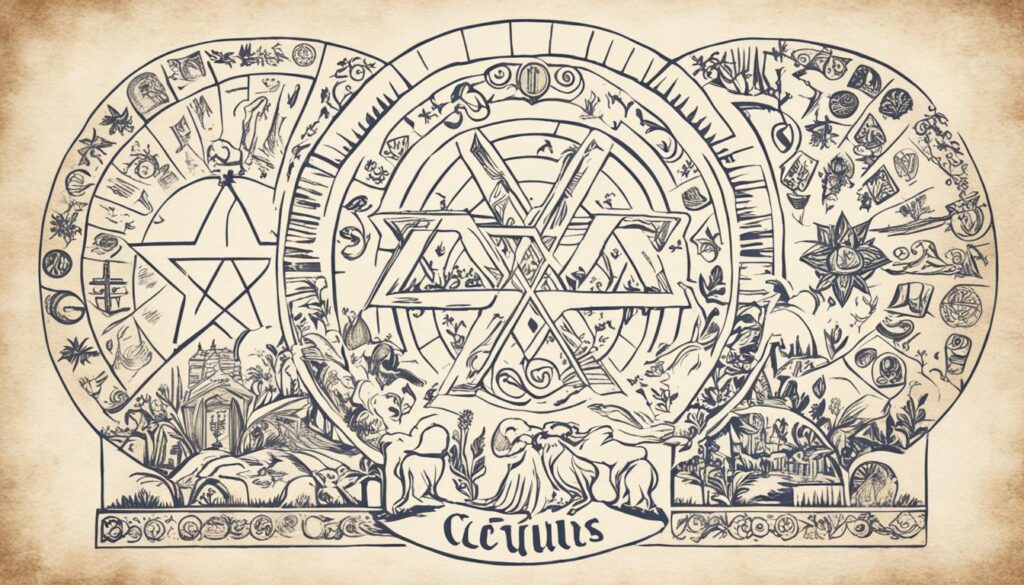
Everyone’s journey with faith is unique, deeply affecting their lives. For many, faith is a quiet trust in tough times. It’s a steady friend through life’s ups and downs. It’s also the spiritual devotion that feeds our inner self.
Starting a faith journey is like walking a path full of light and questions. It’s a journey that changes us at every turn. It’s a path that promises growth and learning.
As we walk the paths of belief and trust, we find the heart of our existence. This journey is a personal experience that shapes who we are and what we value. The article aims to explore this journey, showing how belief turns into deep spiritual devotion.
We invite you to join us on this journey to find your own story in faith. With guidance from wise voices and sacred texts, let’s start to connect with each other. Together, we’ll explore the journey of faith and discover the essence of trust, belief, and hope.
Key Takeaways
- Understanding faith as a personal and evolutionary experience.
- Recognizing the intimate role of spiritual devotion in individual lives.
- Exploring the journey of faith as a path toward personal transformation.
- Reflecting on the essence of faith and its manifestation in belief and trust.
- Considering the impact of faith on one’s identity and worldview.
The Essence of Faith in Personal Life
At the heart of every person’s spiritual path, faith has a huge impact. It goes beyond just religious acts and touches our everyday lives. Faith brings a deep belief and hope, even in hard times. This part looks at how faith is more than just an idea. It’s a powerful guide in personal growth and emotional health.

The journey of faith often starts with hope. In tough moments, faith shows its strength, bringing comfort and a way forward. Believing in things we can’t see is what faith is all about. It gives us a sense of certainty when things are unsure. Whether it’s making big decisions, dealing with loss, or handling daily stress, faith helps us stay strong and find peace.
When we talk about personal choices and goals, faith is there, even if we don’t see it. People share how faith has guided their decisions and helped them get through tough times. This shows how adding spirituality to our lives can change us.
“Faith has been my anchor, providing not only a framework for making choices but also comforting me in times when nothing else seemed certain.”
Emotionally, faith gives us a strong sense of purpose and connection to something bigger. It also helps our mental health by lowering stress, anxiety, and depression. Research shows that being spiritual can increase serotonin levels, showing how faith affects us physically too.
| Aspect of Life | Influence of Faith |
|---|---|
| Decision Making | Guides ethical choices, enhances clarity |
| Emotional Health | Reduces stress, fosters inner peace |
| Social Relationships | Improves compassion and empathy |
| Physical Health | Linked to lower blood pressure and improved immune function |
| Purpose in Life | Strengthens sense of purpose, enhances life satisfaction |
In conclusion, faith is key to a full spiritual journey. It shapes our beliefs and practices, and boosts hope and positivity in life. Faith is essential, not just in spiritual activities, but also in our daily lives and challenges.
Historical Perspectives on Faith Across Cultures
The world’s history is filled with cultural diversity in faith. Each culture has its own story in the historical development of religion. These stories show how faith has shaped societies and connected people worldwide.

The Role of Religion and Spirituality in Human History
From ancient Mesopotamia to Pre-Columbian America, spirituality has always been key to human life. It helps us understand how faith has guided societies, laws, and ethics. It shows our deep need to grasp the divine and life’s order.
Interfaith Understanding and the Common Threads of Belief
Today, talking across faiths is more important than ever. By finding what faiths share, we see how different beliefs make our world richer. This approach builds respect and cooperation, showing that love, compassion, and justice are shared by all. These values connect us and help build global peace.
Understanding the Different Facets of Belief
Exploring belief systems shows us how spiritual beliefs, doctrines, and faith traditions shape our view of the world. Each system gives us unique views that make our spiritual lives richer and more complex.

From structured religions to personal spirituality, every tradition teaches us about the spiritual journeys we all go through. Looking at these systems together helps us see their differences and similarities. We learn about the practices and goals that connect people across cultures.
- Buddhism: Emphasizes the path to enlightenment through understanding and meditation.
- Christianity: Focuses on the teachings of Jesus Christ and the salvation through faith.
- Islam: Highlights submission to the will of Allah, as revealed in the Quran.
- Hinduism: Offers a framework of doctrines encompassing various gods and practices leading to spiritual liberation.
Learning about these faith traditions helps us respect and understand people who believe differently. It’s not just about knowing their beliefs. It’s also about building a bridge to global harmony and encouraging dialogue between faiths.
Nurturing Trust in the Divine and the Universe
Starting a spiritual journey means understanding we’re deeply connected to the universe. This journey helps us find peace by building trust in a higher power through faith.
Letting Go of Control and Embracing Higher Power
Surrendering to a higher power isn’t about being weak. It’s about recognizing we can’t control everything. This shift brings us true freedom and happiness by linking us with the universe’s forces.
The Interconnectivity of Trust and Hope in Faith
Trust and hope go hand in hand in faith. Hope comes from believing in a divine plan. Trust grows as we take hopeful steps. This balance is key for spiritual growth, showing us life’s purpose and our place in it.
Here’s a table to show how this works:
| Aspect | Impact on Individual | Relation to Universal Harmony |
|---|---|---|
| Surrender | Reduces personal anxiety and control issues | Enhances feelings of unity and peace with the universe |
| Trust | Builds resilience and courage in adversity | Demonstrates an alignment with universal cosmic laws |
| Hope | Encourages perseverance and positivity | Acts as a catalyst for manifesting greater goods |

Personal Stories of Faith Encountering Adversity
In a world filled with big challenges, stories of faith show us how to overcome them. These stories are full of resilience and show the spiritual strength that helps people in hard times. They show us how faith can be a light of hope and power in tough situations.
For many, faith is a key part of their lives. It gives them a strong base when challenges come. Some find strength in religious beliefs, while others feel connected to a higher power or the universe. This connection gives them comfort and strength.
Let’s look at how different people use their faith to get through tough times.
- Many find their faith gets stronger when they face challenges. They believe in a better future, even in dark times.
- Some say their spiritual activities, like meditation or prayer, brought them peace and a new view during hard times.
- Others talk about how their community of believers helped them. They got emotional and practical support, showing the power of community.
These stories are not just inspiring. They remind us of faith’s power to build resilience and spiritual growth. When facing challenges, faith doesn’t just help us escape. It makes us stronger, giving us the courage and grace to keep going.
The journey of faith in hard times is unique and deep. It connects people to their inner strength and to a wider community. It brings hope and renewal in the storm. By holding onto their faith, many find the strength to overcome obstacles and come out stronger.
Exploring Faith Through Religious Texts and Teachings
Looking into sacred texts gives us a deep look at faith and morality. These texts from different religions show us the scriptural wisdom that guides many people around the world.
Wisdom from the Scriptures: Bible, Quran, Bhagavad Gita, and More
The Bible, Quran, and Bhagavad Gita are more than old books. They are filled with knowledge that still touches people’s hearts today. These sacred texts go beyond time and culture. They teach us how to find spirituality and understand ourselves better.
- The Bible teaches about compassion and forgiveness. It encourages us to live a life full of love and helping others.
- The Quran talks about the value of community and brotherhood. It guides us on how to live together peacefully, even with those who are different from us.
- The Bhagavad Gita explores the idea of duty and how to find spiritual freedom.
How Religious Leaders Interpret Faith in Modern Times
In today’s world, spiritual leaders play a big role in connecting ancient teachings with modern challenges. They help us see how the wisdom of sacred texts can guide us through tough times.
- They talk about living ethically during hard times.
- They offer guidance on keeping faith when things get tough, both personally and as a society.
- They adapt old teachings to make them more inclusive and understanding for all cultures and communities.
Through these teachings, leaders show us how scripture can bring comfort and answers. They highlight the lasting impact of scriptural wisdom in helping us find peace and understanding in a changing world.
Cultivating Devotion and Worship in Daily Life
Adding worship to our daily life can change simple moments into chances for spiritual growth. By setting daily rituals and spiritual habits, we deepen our devotion. This brings peace and purpose to each day.
Many people set aside time for prayer, meditation, or reading the Bible. These times become key parts of their day. They offer stability and comfort, keeping the person close to their faith.
- Morning meditation to set the intention for the day.
- Prayer sessions at regular intervals to give thanks or seek guidance.
- Evening reflection to review the day’s events and personal growth.
Being part of a community worship is also key. It helps strengthen daily rituals. It grows our spiritual life and brings us closer to others.
Adding things like music, incense, or special clothes can make worship more powerful. Whether it’s a choir or a lit candle, these things make the experience deeper.
By making our lives and spaces fit these practices, we create a strong faith framework. This supports and enriches our daily lives. These spiritual habits help us stay strong through life’s tough times.
The Intersection of Faith, Ethics, and Morality
Exploring the link between faith and making ethical choices shows how our beliefs shape our moral compass. Faith guides our actions and shapes the ethical rules that keep communities together.
How Faith Shapes Our Understanding of Right and Wrong
Faith is key in setting what’s right and wrong for many. Spiritual teachings give us moral rules that encourage honesty and right actions. These rules are vital for society, helping us choose what’s best for us and everyone else.
The Impact of Faith on Community and Global Conscience
Many faiths bring people together with shared ethical values. These values push us to act for peace and unity. Faith-based ethics are crucial in solving big issues like inequality, environmental problems, and global conflicts.
Seeing how faith affects our choices shows its big role in society and the world. Here’s a look at how different faiths bring ethics into daily life and community life.
| Faith Tradition | Core Ethical Teachings | Impact on Communal Harmony |
|---|---|---|
| Christianity | Love your neighbor as yourself. | Promotes inclusivity and social support. |
| Islam | Honesty and justice in dealings. | Enhances trust and fairness in the community. |
| Buddhism | Compassion and non-harm to all beings. | Fosters peace and mutual respect among community members. |
| Hinduism | Dharma (righteousness) and ahimsa (non-violence). | Encourages peaceful coexistence and respect for life. |
Scientific and Psychological Views on Belief and Spirituality
Exploring how spirituality and thinking connect, recent empirical research on faith shows interesting findings. These studies reveal big psychological benefits from spiritual activities.
Studies show that being spiritual can change the human brain. People who practice spirituality often have better thinking skills. This link between spirituality and cognition shows that being mindful spiritually can make you think clearer and feel better overall.
| Aspect | Impact on Cognition | Psychological Benefit |
|---|---|---|
| Meditation and Prayer | Increases focus and mental clarity | Reduces anxiety and depression |
| Communal Worship | Enhances social cognition skills | Improves sense of belonging and community support |
| Spiritual Reading | Improves comprehension and reflective thinking | Boosts empathy and moral reasoning |
Also, spiritual practices like meditation help you know yourself better and make you emotionally stronger. This mix of spirituality and mental strength is a key area to study. It shows how spiritual and material worlds connect in our faith.
So, adding spirituality into daily life is not just about faith. It’s also backed by science as a way to improve mental health and thinking skills. The study of faith, spirituality, and thinking shows how spirituality can change our psychology in big ways.
Finding Faith Within Yourself: A Personal Reflection
Starting a journey of self-discovery and spiritual awakening begins with a key step. It’s about recognizing the need for deeper connections within oneself and the universe. This journey is filled with faith-based practices. It invites people to look into their inner world and the spiritual parts of their existence.
Embarking on a Journey Towards Self-Discovery and Spiritual Awakening
Self-discovery is more than just knowing who you are. It’s also about seeing who you can become. By exploring spiritual awakening, you dive deep into your faith and beliefs. This journey can change you in big ways, making your connection to the spiritual world stronger and helping you grow personally.
Tools and Practices for Deepening Your Faith
Adding faith-based practices to your daily life is key for spiritual growth. Activities like meditation, prayer, and reading deeply can connect you more with the spiritual world. These practices bring peace and wisdom, creating a space where you can really discover yourself.
- Meditation: Creates a space for reflection and quietude, allowing individuals to connect deeply with their faith.
- Prayer: Opens communication with the divine, enriching spiritual life and providing guidance.
- Contemplative Reading: Engaging with sacred texts to gain insights and a deeper understanding of faith principles.
The path to self-discovery and spiritual awakening is personal but also connects us all. It’s filled with questions, challenges, and big realizations. These are all important for growing and finding fulfillment in your spiritual journey.
Starting a journey of belief is like sailing through life’s vast waters. We’ve seen how faith helps us grow, understand different cultures, and build strong ethics. Through history, spiritual insights have brought people together across time and places.
These insights show us how faith connects us. We’ve looked at ancient wisdom and stories of people who found strength in faith. They show us that seeking fulfillment through faith is a common goal.
Belief and spirituality touch our minds and sciences, shaping our views. Yet, faith’s role in giving hope and direction remains strong for many. People find comfort in faith, whether through prayer or religious teachings, during tough times.
Everyone’s faith journey is different. Some find peace in quiet thought, while others in active worship. Faith is a journey that invites us to explore our deepest desires.
These pages aim to inspire and guide those seeking spiritual growth. As we end this chapter, we’re at the start of a new journey. Every step of faith is a journey, leading us to fulfillment and more discoveries.


